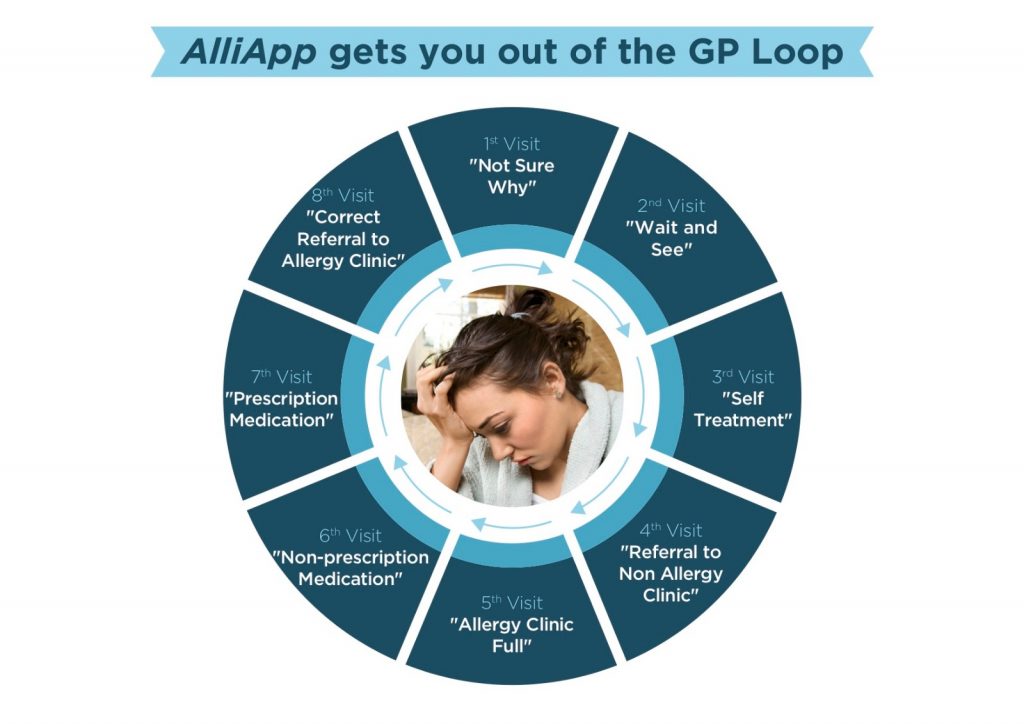Allergies, food intolerance and chronic illnesses are a major problem in the UK. AlliApp health and food diary has been developed to enable allergic and atopic patients (ie those with conditions caused by triggers in their diet and environment), to discover the root causes of their illness symptoms.
AlliApp – a doctor-trusted health app
In his clinical report: An Allergy App to Facilitate the Integration of Children’s Allergy Service Across Primary and Secondary Care (2017), Dr Jimmy Abraham, senior NHS paediatric allergist with the Lewisham and Greenwich NHS Trust, outlined the value of incorporating AlliApp into clinical care:
‘AlliApp is a doctor-trusted allergy and food sensitivity app with a built-in food diary. Photos of a patient’s diet and symptoms can be showed to clinicians to improve referrals and consultations. It is a way for parents to track their own and their child’s reactions so they can get the support they need.’ – Dr Jimmy Abraham MSc

‘The GP Loop shows how a lack of allergy information and evidence in clinic, results in a costly, inefficient and slow allergy diagnosis’ – Dr Abraham
AlliApp and the “Unmet Need”
First of all, the statistics: Here is a quote from the seminal clinical report, Allergy: the unmet need:
”In the UK over the last twenty years, the incidence of common allergic diseases has trebled, giving this country one of the highest rates of allergy in the world. In any one year, 12 million people in the UK (one-fifth of the population) are now likely to be seeking treatment for allergy.”
AlliApp health and food diary was created to help meet this unmet need.
“Despite the epidemic proportions of the disease, the health service is failing to meet the most minimal standards of care. Allergy: the unmet need shows clearly that there are far too few specialist allergists to meet the needs of the population.”
AlliApp and NHS Innovation
The children’s allergy service at London-based Queen Elizabeth Hospital (QEH) became the backdrop to develop the AlliApp app, in order to create an integrated care pathway across primary and secondary care.
Shortlisted for an NHS Innovation Challenge prize, AlliApp worked together with Dr Abraham. He said:
‘We needed the patient to be involved using technology to track adverse clinical events in real time and to convey this message accurately and quickly to the right professional at the right time’.
AlliApp and the NHS budget

Allergies and food/environment sensitivity are increasing dramatically and putting a major burden on NHS budgets. In the UK, allergic and atopic conditions constitute the commonest causes of chronic disease in childhood, and affect upwards of one fifth of the child population. Hospital admissions for allergies are also increasing. Due to a lack of swift and effective integration in connecting the patient’s symptoms to their source – ie their allergic and chronic illness triggers – much time and money is lost in trying to discover what is causing allergies and sensitivities in millions of people in the UK population.
AlliApp saves time and money
It is essential that a way is found to join the dots and quickly and accurately discover the foods and conditions that produce allergic and atopic reactions. Dr Abraham used evidence produced in the clinical trial to calculate that the NHS can potentially be saved £500+ per patient when they use the AlliApp health tracker:
‘The adoption of the app successfully showed pathway savings between £538 – £900 per patient.’ – Dr Abraham
His ”Patient Pathway” calculations (Table 1) showed at least a £538 pathway saving, in cases of severe allergy:
Table 1
NHS Visit 1 – GP – Rash and vomiting. Told to avoid egg in diet. Keep Piriton at home – £50
NHS Visit 2 – A&E – Serious reaction to choc bar. Vomiting and breathing probs. Advised possible nut allergy. Told to go to GP – £124
NHS Visit 3 – – GP – Avoiding nuts and eggs in diet. Referred to paediatrics at local hospital – £50
NHS Visit 4 -paediatrician – No reaction. Asked about reaction history. Did blood tests to check for allergies. Referred to allergy clinic. – £240
NHS Visit 5 – A&E – Serious reaction. Strongly advised to visit allergy clinic – £124
NHS Visit 6 – Allergy Clinic – Nut allergy confirmed. Care plans and adrenaline auto injector given. Management plans for schools given – £240
According to Dr Abraham, in cases of mild allergies there is a potential of £900 pathway savings, as it typically takes 18 repeat GPs visits at £50 each, over many years, before an allergy is suspected and appropriately referred.
AlliApp – the missing link between patient and clinic

As the missing link between patient and clinician, AlliApp speeds up the time taken to discover the causes of allergies and food sensitivites, thus saving time and money for both the NHS and the patient. It can also be a life saver – anaphylactic shock and severe allergic reactions can be life threatening.
‘Integrating this service with the wider health community involved in the patient’s care is key to success. Using (AlliApp) technology is merely to facilitate the reinforcement of existing clinical relationships for the benefit of the patient and to improve efficiency. It is a way to help record the symptoms, triggers, additional information and outcomes of interventions alongside the actual photos of the signs and ingredients involved in the reaction.’ – Dr Abraham




